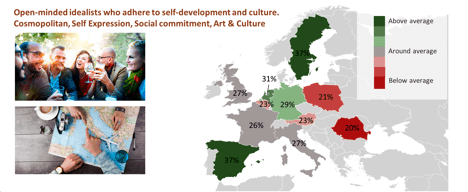3 Challenges the EU Must Overcome
Although the recent Eurobarometer indicates that support for the EU is on the rise, undermining and potentially disruptive forces are very much alive. The EU is still at a critical stage. In this article, you will discover three challenges the EU is facing and needs to overcome to regain broader support of the population and prevent existential crises from happening again.
1. Get out of the EU Creative Bubble
Glocalities values-based research reveals that pro-Europe sentiments and support is grounded in a particular values-based segment: the Creatives. This population segment, which represents approximately 1 in 4 people in Europe, identify as global citizens, embrace cultural diversity and worry about economic inequality. These Creatives are liberal idealists, who value personal development and culture and are among the most politically active. Within Europe, the Creatives segment is especially large in Western Europe, while this population segment is much smaller in the newer EU member states in Eastern Europe. There the Conservatives are large. The East-West divisions within the EU can be largely explained by this values divide.

Figure 1: population share of Creatives values segment in 11 EU countries
The Creatives mindset is especially dominant among EU officials in Brussels and typical for the Brussels bubble. The EU is rooted in cosmopolitan and enlightenment values that characterize Creatives. It is crucial to broaden support for the EU among other population segments.
EU communication often echoes creatives values: an EU of innovation, open borders, protecting refugees, international solidarity. These values reinforce the image of an EU that primarily serves the interests of higher educated, cosmopolitan elites.
The EU project is stuck in the Brussels bubble of like-mindedness. Within this bubble, many EU officials are puzzled by Eurosceptic sentiment which they don’t see reflected among their peers and friends. Eurosceptic forces in the meantime are winning support among other values based segments in society. Eurosceptic leaders frame the EU as out-of-touch indecisive elite which does not listen to the concerns of ‘normal’ citizens. The EU often reinforces this frame by communicating from its own values perspective and not putting an audience perspective front and center in their policy agenda and communications. Unwillingly this is to the advantage of right wing populist leaders who reinforce negative frames and stereotypes of the EU. And this is a major handicap. If you want to persuade people to go along you have to be willing and able to step into their shoes and find the middle ground. In order to stay ahead the EU should win the hearts and minds of the silent majority.
Since the disruptive forces that want to break up the EU are very much alive, the EU will stay in the danger zone from election to election unless it reconnects with a broader range of values-based segments across all EU member states. Therefore, the EU needs to better listen to middle- class concerns and improve EU communication based on the perspectives of a greater diversity of values-segments among the population.
The first challenge the EU officials have to overcome therefore is to quickly jump out of their bubble. EU officials need to be aware of their own values and how these reflect and shape how they communicate. When they are able to take a helicopter view they will be far better equipped to find the policy and communications sweet spot with other societal segments and win the hearts and minds of EU citizens in the long run.
2. Reconnect with the Silent Majority
Based on the recent Eurobarometer results, EU officials might think all is going well, and it is time at last to get back to normal. But nothing could be further from the truth. The populists have not been beaten but have grown stronger.
The second challenge for the EU officials is, therefore, to understand that they are still at risk of losing the EU altogether.
It is crucial to understand that Eurosceptic parties have still been gaining support in 2017, despite the media spin that populism in Europe has been beaten (this interpretation has been especially strong after the elections in France due to the Macron effect). In country after country rightwing populist and Eurosceptic parties have in fact increased their voter base. This is true even for France (highest score for Front National during presidential elections ever) and Great Britain (Conservatives have a similar vote share as Thatcher in her high-days, which did not translate in seats because of the district system) not to mention Austria, Netherlands, Czech republic and Germany and what might happen in Italy and Hungary.
The EU tends to overestimate the growing support for the EU by missing what is driving those pro-EU sentiments under the surface. The EU needs to realize that the increase in the percentage of people who are positive about the EU does not necessarily express that these people have turned pro Europe.
By looking beyond the attitudes and opinions (does support go up or down in a specific country) and focusing instead on values and storytelling, in depth Glocalities research reveals a different explanation for this 'so-called' growing support for Europe.
We refer to this as the Anti-Rebel effect and the longing for stability by the EU middle class:
Glocalities data shows that the silent majority (neither cosmopolitan in mindset, nor voting for rightwing populist parties) scores very negatively on the rebel archetype (they are in fact anti-rebels). The rebel wants to overturn what isn’t working, to disrupt and shock and even destroy. This is contrary to the psychology of the risk averse silent majority. The silent majority instead is drawn to the archetype of the ruler: strong leadership, the promise of economic progress and strong authoritarian leadership.
Trump is the American embodiment of the authoritarian ruler archetype (see our report about Trump supporters). However, from a European perspective he increasingly started to look like a rebel threatening stability, prosperity and national interests in Europe. This image was reinforced by news from Brexit which looked to severely disrupt economics and society in Great Britain. Angela Merkel in Germany is the embodiment of this anti-rebel sentiment which she successfully cultivated during the last German elections.
The silent majority we are talking about is in need of stability, safety and order.
The EU has been profiting from anti-rebel effects in 2017. But it is a big mistake to think that the silent majority has become more supportive of the EU. On a values level, they feel disenchanted with the EU. Due to lack of a safe alternative they support the EU, but not wholeheartedly.
This means the EU has bought time to reorganize itself, step over the anger and disappointment (the first 2 stages of grief) of growing EU skepticism, and start working on a genuine solution.
To convey that solution and attract a larger part of the EU population, they need to look far more refined to various segments within a country, better listen to how they feel and think about the EU and also look at the values based drivers of EU support or lack thereof.
In other words, the communication has to be values-driven, but the EU needs to tell more diverse and genuine stories that each will resonate with the various values-segments within the population of the diverse EU member states.
3. Mobilize Millennials in support of the EU
One of the biggest opportunities for the EU in the long run is to mobilize the youth in support for the EU.
Millennials generally score low on the trend of nationalist pride. They have a globalized mindset because they grew up in an interconnected world. They feel more at ease in a world where they have to move beyond national borders to organize things and work together on common challenges.
However, EU officials need to understand that Millennials are very diversified. They have some things in common, but there are substantial differences between Millennials worldwide and in EU. The EU need to take that into consideration when developing communications. To learn more about that, please download our Millennial Report.
The EU could appeal to Millennials by making the case that the EU helps them achieve their ambitions. This message offers a big opportunity to reach this generation that is still at an early stage of their life, looking for opportunities and development. This is exactly the reason why many British Millennials voted against Brexit, which may limit their international careers and ambitions.
By understanding the shared values of Millennials, the EU can more effectively develop policies and messages that will attract Millennials and win them over to support the EU. Glocalities research, for example, shows that Millennials score high on values like ambition, adventure, success, self-confidence and accumulating wealth in the future. These are the kind of aspirations that the EU can use and create a genuine story that tells them the EU makes this possible.
This will only work if EU officials tell the story in a very realistic way and avoid too idealistic messages which don’t resonate with Millennials ambitions.
Taking EU communications to the next level
The World of Glocalities Application helps identify values-segments across EU member states and detect the kind of stories, values-based communications and persuasion tactics which resonate with them. The World of Glocalities can be used to build communications to connect with different groups in society on an emotional level. Think about Millennials and silent majority segments in each member state. By using more encompassing stories, the EU can move away from technocratic language and start talking about the day-to-day concerns of people in a way that they understand and moves them emotionally. The EU needs to encompass more than just a bureaucratic and intellectual project.
This can be illustrated with one of the most sensitive issues in the EU: immigration.
Current EU communications tends to focus on the rights of refugees, international problems which need international solutions and project initiatives in Africa. It is communications developed from a Creatives mindset. If you broadened the message to connect with the conservative values-segment, you would need a different kind of communications. Conservatives are family oriented people who value tradition, etiquette, and structure and are locally oriented. So, if you want to win them over to support immigration you need to assure them first that the immigration process is indeed under control and deliver on this point. Then you should communicate the issue in words that bring it closer to home, so people can identify with the problem and connect on an emotional level. This means that when you are talking about immigration, for example, you should not only refer to international treaties or ideological values like solidarity but also talk about family values, care, compassion and reuniting families and taking care of children. The EU has to dare to communicate from the perspective of an EU citizen who is confronted with an asylum center in their village and the very mixed feelings this brings about.
The EU needs a communications upgrade which is about thinking outside the box instead of communicating solely inside the bubble. We have to be aware that the conservative values segment can go two ways. Right-wing populists are using psychology driven communications tactics (e.g. based on OCEAN scores) to talk about the same issue. To win over conservatives, rightwing populists talk about traditions that are under attack, losing national values and induce fear by framing migration in terms of invasion, being out-of-control and terrorism.
In Conclusion:
To make values-based communications work to its advantage, EU officials need to take a listening approach and move away from using one central voice coming from Brussels. The cultural and social-political context is so different per country that there needs to be much more tuning of communications on a national level. The solution is to work with intermediaries, EU representatives who are located in various member states, understand the national cultural and political context and develop country-specific values-based messages. The EU needs to glocalize its communications strategy.


